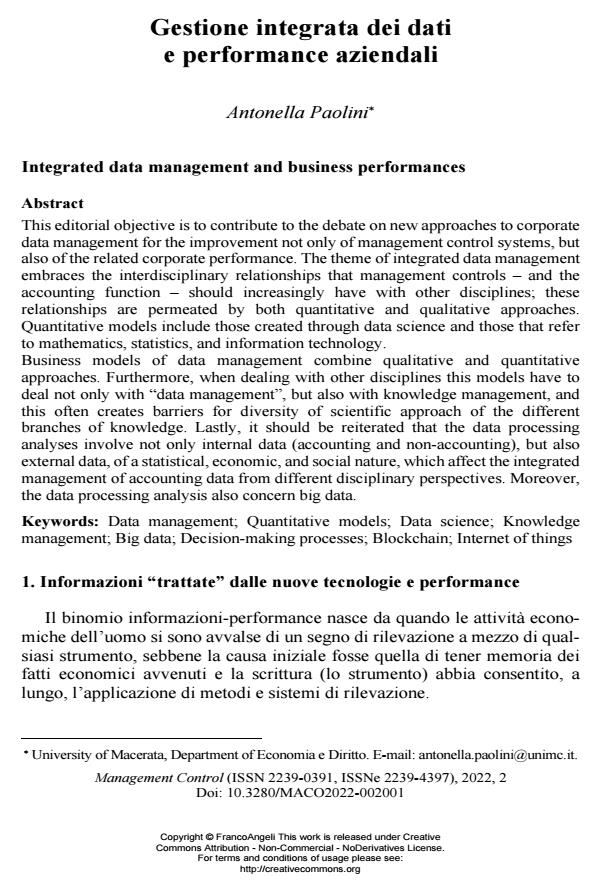Integrated data management and business performances
Journal title MANAGEMENT CONTROL
Author/s Antonella Paolini
Publishing Year 2022 Issue 2022/2
Language Italian Pages 10 P. 5-14 File size 149 KB
DOI 10.3280/MACO2022-002001
DOI is like a bar code for intellectual property: to have more infomation
click here

FrancoAngeli is member of Publishers International Linking Association, Inc (PILA), a not-for-profit association which run the CrossRef service enabling links to and from online scholarly content.
This editorial objective is to contribute to the debate on new approaches to corporate data management for the improvement not only of management control systems, but also of the related corporate performance. The theme of integrated data management embraces the interdisciplinary relationships that management controls - and the accounting function - should increasingly have with other disciplines; these relationships are permeated by both quantitative and qualitative approaches. Quantitative models include those created through data science and those that refer to mathematics, statistics, and information technology. Business models of data management combine qualitative and quantitative approaches. Furthermore, when dealing with other disciplines this models have to deal not only with "data management", but also with knowledge management, and this often creates barriers for diversity of scientific approach of the different branches of knowledge. Lastly, it should be reiterated that the data processing analyses involve not only internal data (accounting and non-accounting), but also external data, of a statistical, economic, and social nature, which affect the integrated management of accounting data from different disciplinary perspectives. Moreover, the data processing analysis also concern big data.
Keywords: Data management; Quantitative models; Data science; Knowledge management; Big data; Decision-making processes; Blockchain; Internet of things
- Controllo di gestione e relazioni intraorganizzative: la prospettiva del controller Oppi Chiara, Vagnoni Emidia, Cattaneo Cristiana, Galizzi Giovanna, in MANAGEMENT CONTROL 3/2024 pp.155
DOI: 10.3280/MACO2024-003008 - Dalla misurazione dell'outcome a quella dell'impact: la Sentiment Analysis a supporto della valutazione della performance delle aziende sanitarie pubbliche Christian Di Falco, Guido Noto, Gustavo Barresi, in MANAGEMENT CONTROL 2/2025 pp.157
DOI: 10.3280/MACO2025-002008 - Intelligenza artificiale e accounting: le possibili relazioni Diego Valentinetti, Michele A. Reaa, in MANAGEMENT CONTROL 2/2023 pp.93
DOI: 10.3280/MACO2023-002005
Antonella Paolini, Gestione integrata dei dati e performance aziendali in "MANAGEMENT CONTROL" 2/2022, pp 5-14, DOI: 10.3280/MACO2022-002001